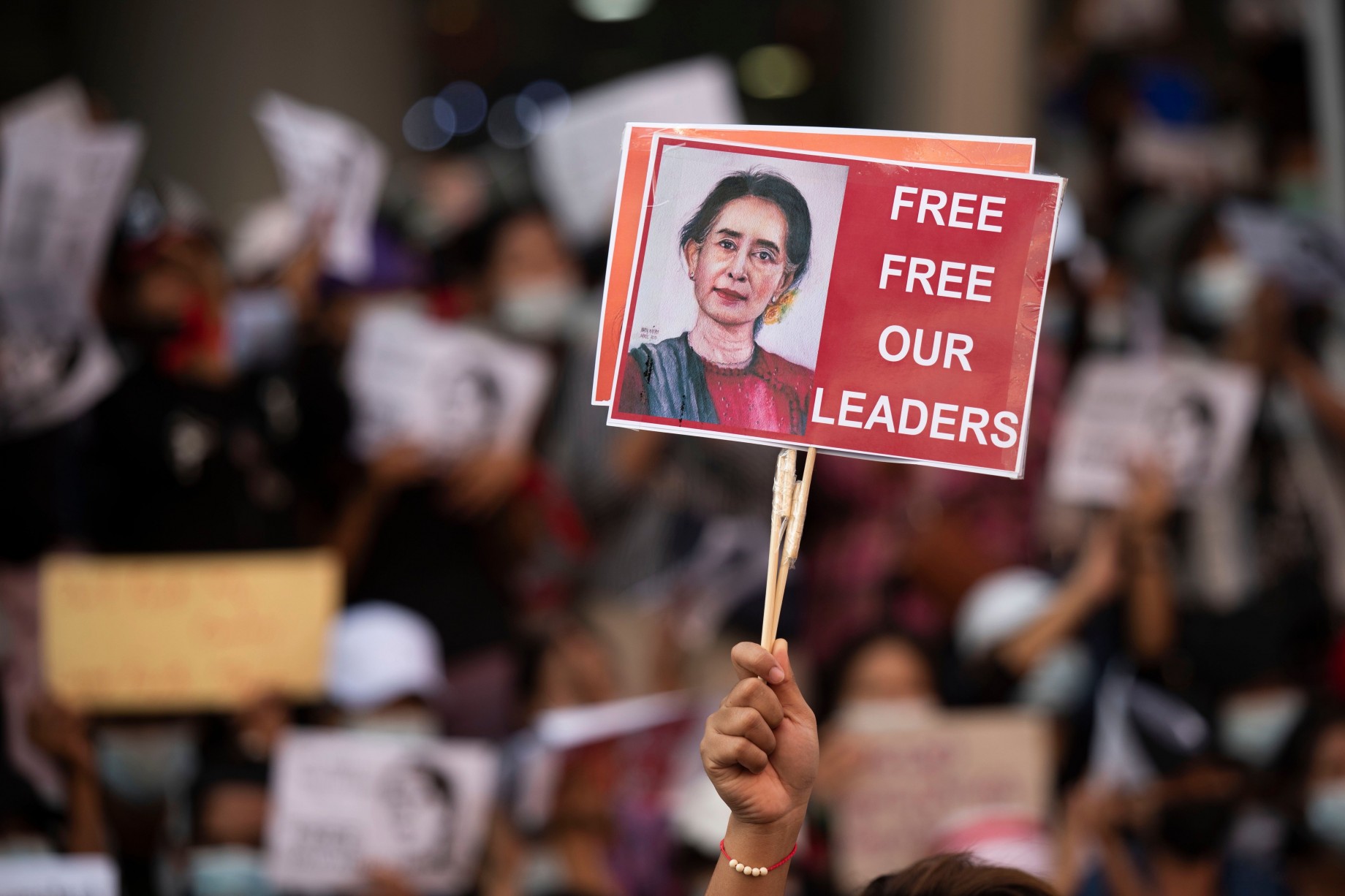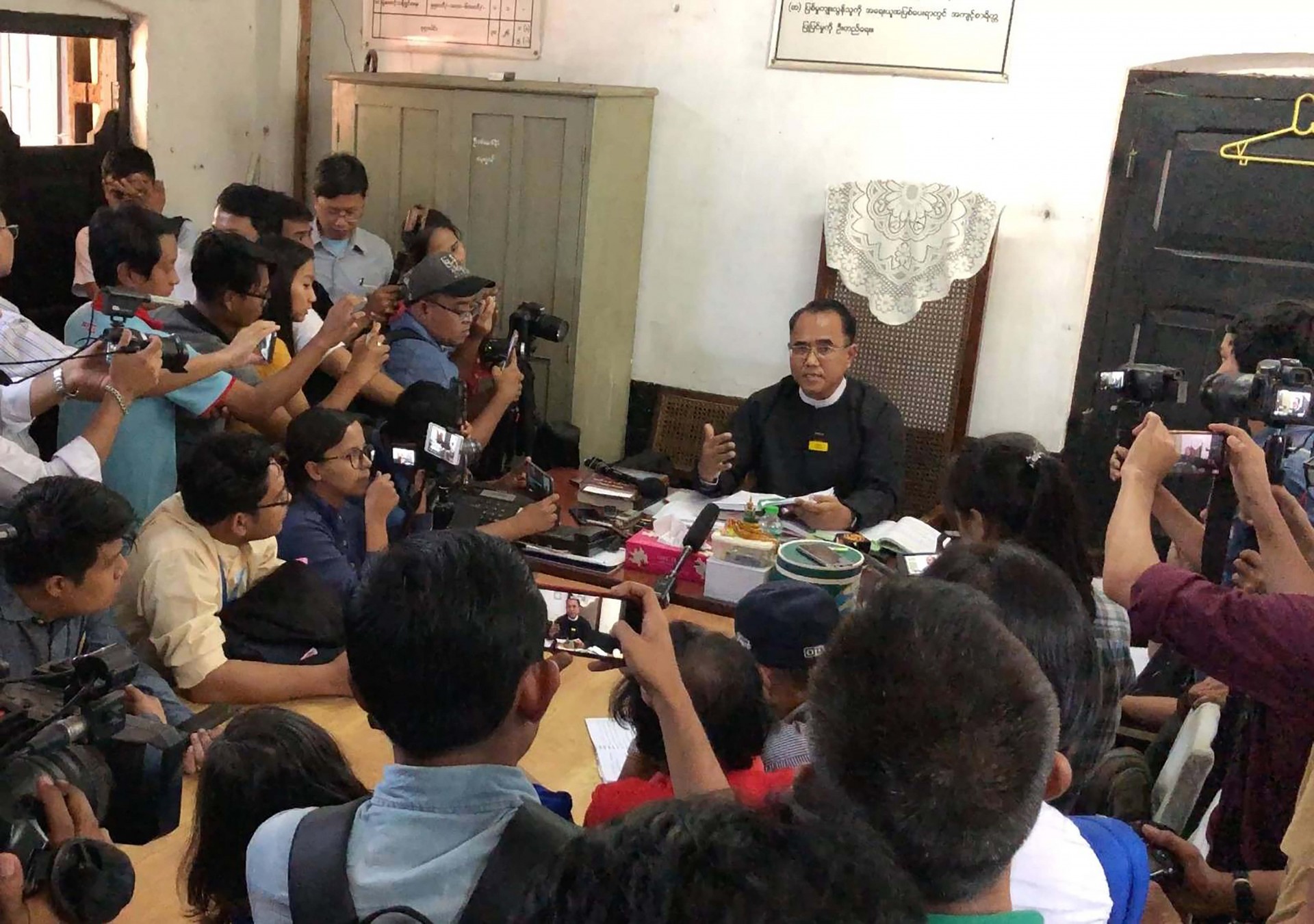
In a country notorious for the opacity of its justice system, Ye Lwin is a rare bird: a judge who is not just a faceless cog in a machine that routinely does the bidding of Myanmar’s military.
Currently serving as a judge in Naypyitaw’s Dekkhina District Court, he has presided over a number of high-profile cases, including those against Aung San Suu Kyi and other members of the country’s ousted civilian government.
Most recently, he was the lead justice in a two-judge panel that last week sentenced Win Htein, a patron of the deposed ruling party, the National League for Democracy (NLD), to 20 years in prison for sedition.
But it was more than three years ago that he first came to prominence, both for his role as information officer during the trial against the killers of Ko Ni, Suu Kyi’s long-time legal advisor, and as the judge who found two Reuters reporters guilty of violating the Official Secrets Act for their reporting on military atrocities committed in Rakhine State.
Now presiding over Suu Kyi’s trial under the same colonial-era law, Ye Lwin’s reputation for coming down hard on defendants is hardly reassuring. But that hasn’t stopped lawyers who have seen him in action from expressing a grudging respect for him.

In the case against Win Htein, for instance, he betrayed no obvious prejudice against the defendant of his defence team, according to Myint Thwin, the lead lawyer for the 79-year-old NLD stalwart.
“The judge was just doing his job. He didn’t stay to look at Win Htein. He just left the court after handing down the sentence,” he said, adding that Ye Win allowed the team to practice “their full rights to defend” their client.
But that will be little comfort to Suu Kyi, who is under no illusions about her chances of receiving a fair trial under the regime that seized power on February 1.
When Myint Thwin, who happened to speak with the NLD leader the day before Win Htein was sentenced, informed her that his client was facing up to 20 years in prison, she jokingly responded: “I think it could be longer for me.”
Unexpected praise
Described by some colleagues as “charismatic” and a good communicator, Ye Lwin is also widely seen as a judge who takes his responsibilities seriously.
“In general, I would say that he is quite trustworthy. He is not the kind of person to get caught up in corruption scandals,” said a retired court officer familiar with Ye Lwin’s career, which began more than two decades ago.
But it is probably his reputation for being approachable, rather than his apparently unimpeachable integrity, that has made the 50-year-old Ye Lwin a suitable pick to handle cases that have attracted both national and international attention.
“He was not a difficult person to talk to,” said one reporter who covered the Ko Ni assassination trial for a foreign news outlet. “Even if he didn’t want to answer a question, he would just try to walk around it, rather than getting angry.”
As the person charged with explaining the verdict in that case, Ye Lwin faced a barrage of questions about why two of the defendants did not receive heavier sentences.
While the two convicted killers, Kyi Lin and Aung Win Zaw, were both given the death penalty, the accused mastermind, former military intelligence captain Zeyar Phyo, received only five years for destroying evidence, while a fourth defendant, Aung Win Tun, got off with just three years for harbouring an offender.

Ye Lwin’s considerable communication skills were on full display as he tried to justify these decisions. But when the name of another suspect—Lin Zaw Tun, a retired army colonel and former aide to Senior General Min Aung Hlaing who went on to win a seat in parliament for the military-backed Union Solidarity and Development Party—was raised, Ye Lwin knew better than to test the limits of his abilities as a public speaker.
“I am just relaying the information on the court’s actions today regarding the case as an information officer. I have already described in detail regarding all the findings and comments in today’s report. I have no other comment to give on this case,” he said calmly as he brought his press briefing to an end.
Even his handling of the case against Reuters journalists Wa Lone and Kyaw Soe Oo earned Ye Lwin praise from an unlikely quarter: a police officer whose testimony as a witness for the prosecution exposed a conspiracy to frame the two defendants.
When former police captain Moe Yan Naing testified that Wa Lone and Kyaw Soe Oo had been set up, it nearly destroyed the case against them. But rather than attempting to silence him, Ye Lwin allowed Moe Yan Naing to speak.
“He did not dismiss my statement. He accepted it as evidence. But in the end, my testimony had no impact on the sentence given to the two reporters,” said Moe Yan Naing, who was later imprisoned for speaking the truth on the stand.
Wa Lone and Kyaw Soe Oo, who had written an investigation into a massacre of 10 Muslim men and boys in northern Rakhine State’s Maungdaw Township in September 2017, were both given seven-year sentences under Section 3(1)(c) of the Official Secrets Act, but were later released on a pardon.

The judiciary since the coup
Myanmar’s judiciary is led by Tun Tun Oo, who has been the chief justice of the Union Supreme Court since 2011. Under the 2008 Constitution, the former military officer (who is not to be confused with Tun Tun Oo, the attorney general who was replaced after the coup in February) can remain in his current position until he reaches the age of 70. In his case, that means he can serve as the country’s top judge for five more years.
But having a former officer in charge of Myanmar’s highest court is not the only way the military exerts its influence over the country’s judicial system. Indeed, since it first seized power nearly six decades ago, the military has steadily stripped the courts of any vestige of the independence they once had.
Aung San Suu Kyi, who was appointed to lead a parliamentary “rule of law” committee months after winning a seat as an MP in a 2012 by-election, has long stressed the need to re-establish the independence of courts as a key pillar of democratic rule.
“My party has repeatedly emphasized rule of law because of the very fact that our judiciary is far from independent. It is a mere tool of the executive. That means not just that the judiciary is undemocratic, but the executive is undemocratic as well and the legislature, too, is undemocratic,” she said in a TED Talk in July 2014.
Now, however, she is once again a captive of the generals, who have not hesitated to use their complete control over the courts to deprive her and all other opponents of their regime of their most fundamental rights.

Currently facing a total of 11 charges, she was not even allowed to have some of her defence lawyers present during the first hearing of her trial under the Official Secrets Act. She faces a sentence of up to 14 years in prison on that charge alone.
This decision sends a clear signal that Ye Lwin, who is presiding over that case, has no intention of breaking with decades of judicial subservience to the will of the military.
Another attorney who has crossed paths with Ye Lwin several times declined to make any comment on his character based on what he has seen in court. In the end, he said, it doesn’t matter what kind of person he is: He will do what is expected of him, as he has done in every other case he has been involved with.
“He did what he had to do during those court hearings. But he may hand down verdicts that we are not happy with at the end of the day,” said the lawyer, who asked to remain anonymous.
Even Moe Yan Naing, who was so impressed by Ye Lwin’s willingness to hear him out when he presented damning testimony of wrongdoing by the authorities, recognized that it was unlikely that he would show such even-handedness under the country’s current circumstances.
“Most of judiciary matters were beyond our control even when we had a president. Now that we’re under a dictatorship, things can only get worse,” said the former police captain.



